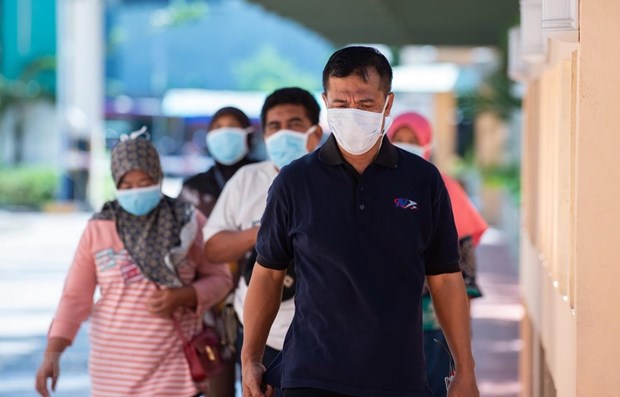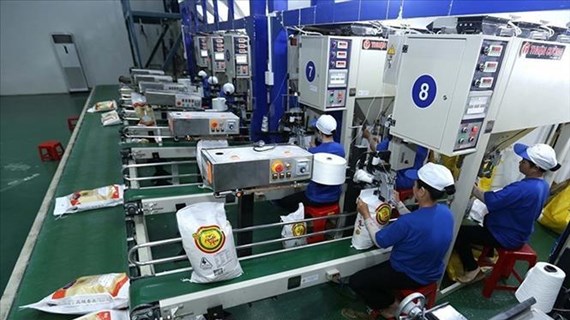Indonesia to suspend visa exemption policy over COVID-19 concerns
Indonesia plans to halt its visa exemption policy for citizens of all countries for one month and expand restrictions for those who have travelled to some of the world's countries hardest hit by the COVID-19 outbreak, in an effort to curb the disease’s spread in the country.
 People in Indonesia wear face mask to prevent the spread of COVID-19 (Photo: Xinhua/VNA)
People in Indonesia wear face mask to prevent the spread of COVID-19 (Photo: Xinhua/VNA)Jakarta (VNA) - Indonesia plans to halt its visa exemption policy for citizens of all countries for one month and expand restrictions for those who have travelled to some of the world's countries hardest hit by the COVID-19 outbreak, in an effort to curb the disease’s spread in the country.
The suspension, which covers exemption for short-stay visits, visa-on-arrival and diplomatic visa-free trips and new travel restrictions will come into effect at the midnight on March 20, said the Ministry of Foreign Affairs of Indonesia in a statement.
The policy will continue to be evaluated in accordance with global developments.
The ministry said that all foreigners or travellers who wish to visit Indonesia must obtain a visa from Indonesian missions in accordance with the purpose of their visit and upon application, applicants must provide a health certificate issued by a relevant health authority from their respective countries.
They must complete and submit a health declaration to the Health Quarantine Office upon arrival at Indonesian airports, it added.
Meanwhile, the temporary travel ban will bar people who have travelled to Iran, Italy, the Vatican, Spain, France, Germany, Switzerland and the UK in the last 14 days from entering or transiting in Indonesia.
At the same time, Indonesia maintained travel restrictions for those with a history of travel to China and the Republic of Korea's hardest-hit regions of Daegu and Gyeongsangbuk-do.
As of March 17, Indonesia had recorded 172 COVID-19 cases, including five deaths, according to its government.
In Thailand, the rise in COVID-19 infections has prompted people queuing to buy the traditional medicinal herb fa talai jone, or andrographis, in the hope it will protect them from the virus.
They are flocking to the sales office of Chaophraya Abhaibhubejhr Hospital, a leading traditional Thai medicine centre in Prachin Buri under the Ministry of Public Health.
A signboard outside the office lists four anti-viral properties of andrographis in Thai and English, saying it prevents the virus entering cells, reduces virus cell division, boosts immunity, and ameliorates lung inflammation from viral infection.
Supaporn Pitiporn, Chairwoman of the Thai traditional and herbal medicine strategic committee of the hospital, said the hospital would soon distribute andrographis seeds to people to grow the plant themselves.
However, medical experts warned there is no scientific evidence that the herb is an effective remedy for COVID-19.
Thailand’s Ministry of Public Health announced additional 30 COVID-19 cases on March 17, bringing the total to 177. The number of new cases in the country hits more than 30 on three consecutive days.
Of the figure, except for one casualty, 41 have been cured while 135 others are receiving treatment. In addition, 7,045 people are under monitoring. However, most of them are diagnosed with seasonal influenza and 65 percent have recovered.
Thailand’s cabinet recently approved a motion to postpone the traditional Songkran holidays from April 13-15 and close schools nationwide to curb the spread of the COVID-19.
Thai Prime Minister Prayut Chan-o-cha on March 15 appealed for calm as escalating fears over the disease are driving people to stockpile food and other daily necessities, saying the Government ensures the supply of essential products./.
The suspension, which covers exemption for short-stay visits, visa-on-arrival and diplomatic visa-free trips and new travel restrictions will come into effect at the midnight on March 20, said the Ministry of Foreign Affairs of Indonesia in a statement.
The policy will continue to be evaluated in accordance with global developments.
The ministry said that all foreigners or travellers who wish to visit Indonesia must obtain a visa from Indonesian missions in accordance with the purpose of their visit and upon application, applicants must provide a health certificate issued by a relevant health authority from their respective countries.
They must complete and submit a health declaration to the Health Quarantine Office upon arrival at Indonesian airports, it added.
Meanwhile, the temporary travel ban will bar people who have travelled to Iran, Italy, the Vatican, Spain, France, Germany, Switzerland and the UK in the last 14 days from entering or transiting in Indonesia.
At the same time, Indonesia maintained travel restrictions for those with a history of travel to China and the Republic of Korea's hardest-hit regions of Daegu and Gyeongsangbuk-do.
As of March 17, Indonesia had recorded 172 COVID-19 cases, including five deaths, according to its government.
In Thailand, the rise in COVID-19 infections has prompted people queuing to buy the traditional medicinal herb fa talai jone, or andrographis, in the hope it will protect them from the virus.
They are flocking to the sales office of Chaophraya Abhaibhubejhr Hospital, a leading traditional Thai medicine centre in Prachin Buri under the Ministry of Public Health.
A signboard outside the office lists four anti-viral properties of andrographis in Thai and English, saying it prevents the virus entering cells, reduces virus cell division, boosts immunity, and ameliorates lung inflammation from viral infection.
Supaporn Pitiporn, Chairwoman of the Thai traditional and herbal medicine strategic committee of the hospital, said the hospital would soon distribute andrographis seeds to people to grow the plant themselves.
However, medical experts warned there is no scientific evidence that the herb is an effective remedy for COVID-19.
Thailand’s Ministry of Public Health announced additional 30 COVID-19 cases on March 17, bringing the total to 177. The number of new cases in the country hits more than 30 on three consecutive days.
Of the figure, except for one casualty, 41 have been cured while 135 others are receiving treatment. In addition, 7,045 people are under monitoring. However, most of them are diagnosed with seasonal influenza and 65 percent have recovered.
Thailand’s cabinet recently approved a motion to postpone the traditional Songkran holidays from April 13-15 and close schools nationwide to curb the spread of the COVID-19.
Thai Prime Minister Prayut Chan-o-cha on March 15 appealed for calm as escalating fears over the disease are driving people to stockpile food and other daily necessities, saying the Government ensures the supply of essential products./.












